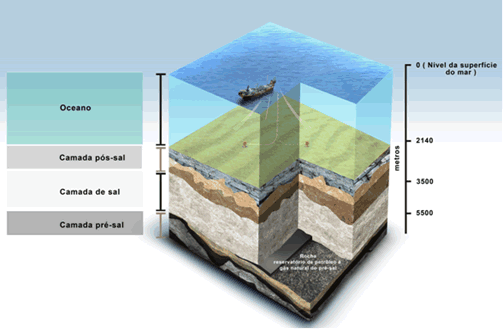The “pre-salt” is an area of oil reserves that lies under a deep layer of salt, forming one of several rock layers in the seabed.
In Brazil, this layer comprises a strip that extends over 800 kilometers. It encompasses Espírito Santo, Santa Catarina, below the seabed, in addition to the sedimentary basins of Espírito Santo, Campos and Santos.
It is called pre-salt, due to the geological time scale, that is, the time of oil formation. The pre-salt oil reserve layer formed earlier (hence the term “pre”) than the other saline layer rock, and was covered up by it millions of years later.
Recently (in November 2010), it was announced that there would be, in Tupi, gigantic reserves of this oil – the estimate is between 5 billion and 8 billion barrels of oil.

Pre-salt production is below depths of 5,000 meters.*
Some obstacles faced in extracting this oil:
* The depth at which it is: depths exceeding more than 7,000 meters. This oil is under two kilometers of water, another two kilometers of rock, and finally another two kilometers of salt crust.
* The salt: salt is the biggest problem faced, forcing Brazil to develop new technologies. At a depth of three or four thousand meters, salt behaves like a viscous, unstable material. Petrobras has basins of up to 5,000 meters deep in the rock, however, it is without salt.
* Cost: due to the depth, the complexity of the operation, the necessary development of new technologies and the increase in the workforce, a large investment by the government will be necessary.
* Keep oil hot: the oil boils inside the rocks and it is necessary to keep it warm, as the drop in temperature induces the formation of clots that clog the ducts.
Benefits with the extraction of oil from the pre-salt:
*The oil reserved in the pre-salt layers is considered light, that is, of low density, being equal to or less than 0.87. The salt layer preserves the quality of the oil. This factor is important, because this way it is much easier to be refined, besides producing more fine derivatives; it has less sulfur, so it pollutes less and, therefore, is more valued in world trade.
*It is estimated to have between 70 and 100 billion barrels of oil and mineral natural gas equivalent. Thus, there will be a big profit for Brazil and, according to the then minister Dilma Rousseff (at the time of the announcement), Brazil could become an oil exporter with this oil. Thus, greater generation of wealth and jobs occurs, in addition to the country acquiring greater political decision-making power.
Pre-salt oil and the environment:
Many environmentalists and thinkers oppose Brazil's way of thinking about investing in oil exploration. They believe this could make Brazil a villain in global warming.
The world is facing a thought of modifying the ways of obtaining energy, by means less aggressive to the environment. Such as, for example, wind and solar energy.
Therefore, going against this thought, the Brazilian government decided to bet on a medium that produces great pollution through its many derivatives. We have, for example, sulfur, carbon dioxide and other gases that pollute the atmosphere; not to mention the spills and accidents that spill large amounts of oil into the ocean, killing many animal and plant species.
All of these factors must be taken into account when making this very important decision, as the benefits and amenities achieved through this precious oil, may in the very near future mean precisely the contrary.
*Image taken from the Pre-salt Diary.
Jennifer Fogaça
Graduated in Chemistry
Brazil School Team
